This article was originally published in June 2019.
Do you ever rest your head at night, toss back and forth under the covers, and think: “I have been going to bed every single night since the day I was born. Why is falling asleep still so hard?” At those moments, when counting sheep just won’t cut it, you might consider handing over all the cash in your wallet in exchange for a peaceful snooze. A full night’s rest is one of the pleasures in life that money can’t necessarily buy — though the pursuit of it has the potential to set you back thousands.
Bedtime has become a multi-billion dollar industry. As social media pushes us to achieve ultimate self-care — and as the world around us becomes increasingly chaotic — we’ve retreated to cozy, safe spaces. We surround our beds with lavish candles, Egyptian sheets, REM tracking devices, white-noise machines and gadgets that pump lavender oil into the air. Chasing flawless sleep is, ironically, exhausting.
However, there is some value to the products being pushed onto us via podcast ads, Instagram influencers and colourfully designed subway banners. Money is being pumped into research on mattress technology, snore-solving devices and ambient sleep tracks (like Headspace’s “Cat Marina”) in hopes of selling consumers a scientifically better slumber. Here are some of the modern sleep aids currently on the market, and what exactly they’re going to cost you.
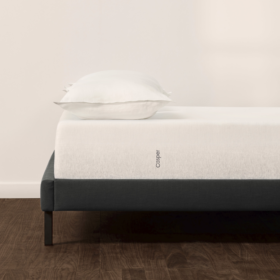
The Millennial-Friendly Mattress
A sweet sleep starts with a solid (or rather, springy) foundation. Over the past few years, millennial-focused brands have reshaped the marketplace for mattresses: they’ve cut out the middleman by putting beds in a box, and have sold a generation the idea that mattresses can be cool. Casper wasn’t the first company to do it, but they’re the name you’ll likely think of first.
If you listen to podcasts or follow any sort of influencer on Instagram, you’ve come across Casper. Their clever use of content marketing has positioned them as a cultural touchstone for all things sleep and comfort. For a while, Casper — like most direct-to-consumer bed brands — only sold foam mattresses. In response to the growing customer demand for a little springier, Casper recently launched two new hybrid mattresses, which combine the embrace of foam with the support of steel coils to create a more resilient, responsive, supportive and breathable sleep surface. It’s the reimagined mattress, reimagined.
What it costs: $1775.00
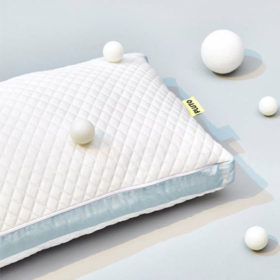
The Personalized Pillow
Pluto takes the Gen X-savviness of Casper and applies it to customized pillows. By having interested customers complete an online quiz, the startup promises to identify the cushion that’s best suited for each individual’s sleep style. “Our proprietary model and pillow designs take a more scientific approach in which we create and personalize pillows to you based on your body stats, how you sleep, and your preferences,” explains founder Susana Saeliu. “This algorithm continues to improve with more orders and customer feedback.”
What it costs: $85.00
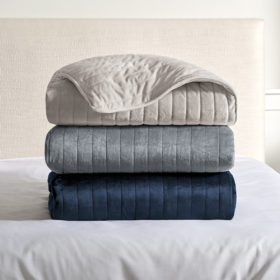
The 25-Pound Blanket
Drape a weighted blanket over your body and feel the tender comfort of a cocoon. The 10 to 20-pound sheets filled with pellets, balls, or chains and covered in fuzz trigger deep touch pressure stimulation, allowing your brain to release feel-good hormones like serotonin and oxytocin. With your stress eased, your eyes will soon shut. Plus, it’s a lot harder to reach for your phone when the weight of a toddler is holding you down.
What it costs: ~$200.00
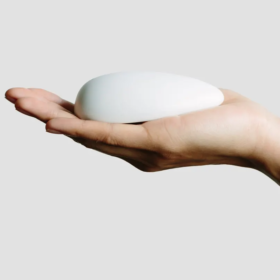
The Smart Snoring Solution
This device is for the person who might be sleeping next to you, and for the good of your relationship. Unlike sticky nose strips and anti-snoring chin straps, Nora keeps you quiet without sacrificing your sex-appeal. The system includes a wireless mic, which sits on the snorer’s nightstand. When it hears your start to snore, Nora uses an “Expander” — which is essentially an air pump and an inflatable device that goes under your pillow — to gently shift the position of your head, stimulating your neck and throat muscles and opening your airways.
What it costs: $329.00

The Snoozy Sleepcast
Swap your nightly Netflix for something a little more mindful. Headspace, a popular meditation app, recently started producing “sleepcasts,” a nighttime audio series that promise to sweet talk listeners into a peaceful snooze. Sign up for an annual subscription, and you can fall asleep to a varied selection of ambient sounds with soothing voiceovers. The app features more than your typical campfire, rainforest and waves on the beach—though it includes those sounds too. More unique options include “Midnight Laundrette,” “Hummingbird Bungalow” and “Cat Marine.” The combination of purring and boat motors is sure to spark some fascinating dreams.
What it costs: $95.88 per year
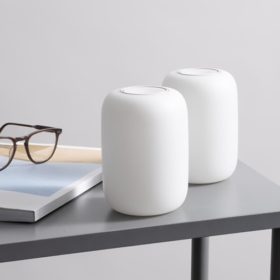
The Lulling Lamp
Casper recently took a short jump from beds to bedside tables. Glow lights, described as the”magical light for better sleep,” slowly dim when it’s time for bed, and then gently mimic the rising sun as they turn on the next morning. The bedtime/wake-up ritual can last between 15 minutes and one and a half hours, and can be customized using a companion app. You can stop reaching for your phone when you suddenly wake at 3am in need of a glass of water, and instead, gently shake the Glow to activate a dim light that self-adjusts to the brightness of your bedroom.
What it costs: $140.00
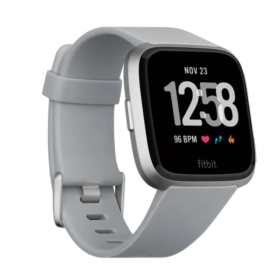
The Sleep Tracker
You think your eight hours of shut-eye will have you well rested for the day ahead. But then, you wake up reaching for an x-large cup of caffeine. Each night, your body cycles through different sleep stages: light sleep, deep sleep and REM. Fitbit’s tracker uses sensitive motion detectors to measure your time spent in each sleep stage, to help you understand the quality of your sleep.
What it costs: $199.99
The post Can You Buy Your Way to Better Sleep? appeared first on FASHION Magazine.
Powered by WPeMatico






